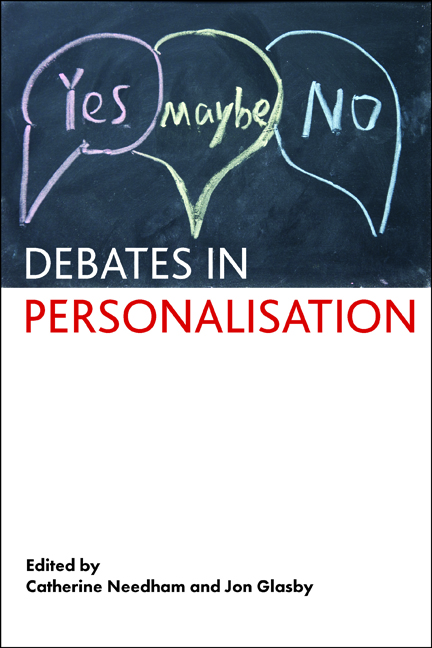Book contents
six - Can personalisation work for older people?
Published online by Cambridge University Press: 04 March 2022
Summary
Introduction
The debates and controversies surrounding the personalisation agenda that have already been identified in this text are clearly evident in the context of services for older people. The development of any policy can be understood as a battle of ideas in which there will be winners and losers (Colebatch, 2005). In this case, as Needham (2011b) has pointed out, the personalisation agenda has gained enormous popularity in the field of social care policy, having now become effectively ‘the only game in town’. However, the ambiguous nature of the concept effectively means that the battle of ideas is still continuing. On the one hand, personalisation is characterised as a revolution in social care, a wholesale cultural shift in the perceptions about how people who need support should be able to exercise control over how it is given. On the other, it is more prosaically seen in terms of the levels of implementation of personal budgets (PBs) and direct payments (DPs) to individual service users, which redistributes responsibility from the state to individuals. Since services for older people constitute more than half of social services expenditure (HSCIC, 2012), it is unsurprising that much attention is being paid to the implementation of personalisation in this sphere, although older service users appear to be less enthusiastic than others about PBs and DPs (Glendinning et al, 2008; Hatton and Waters, 2011). The pressure on councils to increase their uptake raises questions about whether older people are also under pressure to accept PBs or DPs, thus undermining the claims to increased choice and control that are made for them.
This chapter will examine the unfolding story of personalisation in the context of social care services for older people. Ageing is a crucially important issue at both macro- and micro-levels of service provision and the discussion will consider the impact of societal ageing on the development of policies as well as the advantages and disadvantages of personalisation for older service users. The main strands of contemporary critiques of personalisation all have a bearing on this discussion. In general terms, these critiques focus on the willingness and capability of local authorities and the professionals that work in them to implement personalisation policies in daily practice, particularly in the context of the current economic circumstances.
- Type
- Chapter
- Information
- Debates in Personalisation , pp. 55 - 64Publisher: Bristol University PressPrint publication year: 2014



